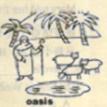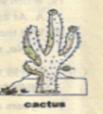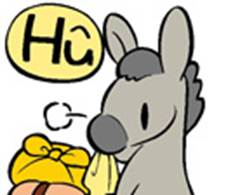
题目列表(包括答案和解析)






| A.it is sandy | B.there is so little rain |
| C.the wind is strong | D.there is no water deep under the ground |
| A.围堵 | B.讨好 | C.释放 | D.吸收 |
| A.the sunlight is too strong in the day | B.they need to see and hear well at night |
| C.it is very cold at nigh | D.they store water in them. |
| A.storing water in side their bodies | B.drinking water as much as they can |
| C.staying underground | D.growing lots of plants |
| A.Desert people like to live in the desert though life is hard. |
| B.People in the desert usually fry eggs on the ground. |
| C.Camels have special fur to store water. |
| D.All the deserts are covered in sand. |
A little boy invited his mother to attend his school’s first teacher-parent meeting. To the little boy’s disappointment(失望), she said she would go. This would be the 16 time that his classmates and teacher met his mother and he 17 lose his face because of her appearance. Although she was a 18 woman, there was a scar(疤痕) that covered nearly the whole right side of her face. The boy never wanted to 19 why or how she got the scar.
At the meeting, the people were 20 by the kindness and natural beauty of his mother even though she had the scar on her face, but the little boy was still embarrassed(尴尬) and hid himself from everyone. 21 , he happened to hear of a talk between his mother and his teacher.
The teacher asked 22 , “How did you get the scar on your face?”
The mother replied, “When my son was a baby, he was in a room that caught fire. 23 was too afraid to go in because the fire was 24 , so I went in. 25 I was running toward his bed, I saw a long piece of wood 26 and I placed myself over him trying to protect him. I was knocked senseless(失去知觉) but luckily, a fireman came in and saved both of us.” She 27 the burned side of her face. “This scar will be there forever, but to this day, I have never 28 what I did.”
At this point, the little boy came out running toward his mother with 29 in his eyes. He held her in his arms and felt a great sense of the sacrifice(牺牲) that his mother had made for him. He held her hand 30 for the rest of the day.
| 【小题1】 |
|
| 【小题2】 |
|
| 【小题3】 |
|
| 【小题4】 |
|
| 【小题5】 |
|
| 【小题6】 |
|
| 【小题7】 |
|
| 【小题8】 |
|
| 【小题9】 |
|
| 【小题10】 |
|
| 【小题11】 |
|
| 【小题12】 |
|
| 【小题13】 |
|
| 【小题14】 |
|
| 【小题15】 |
|
A thousand years ago Hong Kong was covered by a thick forest. As more and more people came to 31 in Hong Kong, these trees were cut down and burnt. Now there is 32 forest left, though there are still some small areas covered with trees. We call these woods.
Elephants, tigers and many 33 animals were living in the thick forest. When people came to live in Hong Kong, the 34 began to die out. Early farmers grew rice and 35 pigs and chickens in the valleys. They cut down the trees and burnt them. They needed 36 to keep themselves warm in winter, to cook their food and to keep away the dangerous animals. Elephants quickly disappeared because there was not enough food for them. 37 did most of the wolves and tigers. Monkeys and many other animals soon 38 in the same way.
You might think that there are no longer any animals in Hong Kong 39 in the zoos. But there are still about 36 different animals 40 there. One of the most interesting of Hong Kong's animals is the barking deer. These are beautiful little animals 41 a rich brown coat and a white patch (补丁) under the tail. They look like deer but they are much smaller. They are less than two feet 42 . They make a noise rather like a dog 43 . In Hong Kong the barking deer has only a real enemy-- 44 . People hunt these little animals though it is illegal (违法的). There are now not many barking deer left. So it is important 45 people to protect wild animals.
| 【小题1】 |
|
| 【小题2】 |
|
| 【小题3】 |
|
| 【小题4】 |
|
| 【小题5】 |
|
| 【小题6】 |
|
| 【小题7】 |
|
| 【小题8】 |
|
| 【小题9】 |
|
| 【小题10】 |
|
| 【小题11】 |
|
| 【小题12】 |
|
| 【小题13】 |
|
| 【小题14】 |
|
| 【小题15】 |
|
A year ago,I paid no attention to English idioms (习语), though my teacher told us the importance again and again. But soon, the importance of English idioms was shown in an amusing experience.
One day, I happened to meet an Englishman on the road, and soon we began to talk. As I was talking about how I was studying English, the foreigner seemed to be surprised. Gently shaking his head,shrugging his shoulders, he said,“You don’t say!” “You don’t say!” I was puzzled. I thought , perhaps this is not a right topic. “Well, I’d better change the topic.” So I said to him. “Well, shall we talk about the Great Wall? By the way, have you ever been there?” “Certainly, everyone back home will laugh at me if I leave China without seeing it. It was wonderful.” He was deep in thought when I began to talk like a tourist guide. “The Great Wall is one of the wonders in the world. We are very proud of it.” Soon I was interrupted (打断) again by his words: “You don’t say!” I couldn’t help asking, “Why do you ask me not to talk about it?” “Well, I didn’t ask you to do so,” he answered, greatly surprised. I said, “Didn’t you say ‘you don’t say’?” Hearing this, the Englishman laughed to tears. He began to explain, “ ‘You don’t say’ actually means ‘really!’ It is an expression of surprise. Perhaps you don’t pay attention to English idioms.” I realized I had made a fool of myself. Since then I have been more careful with idiomatic expressions. Remember: what the English teachers said is always right to us students.
【小题1】A year ago, I paid no attention to English idioms because .
| A.I had no interest in them |
| B.English idioms were very difficult |
| C.I did not realize the importance of them |
| D.my teacher didn’t tell us the importance of them |
| A.I had talked too much |
| B.I had to stop talking |
| C.he was not interested in the topic |
| D.he was only interested in the Great Wall |
| A.interesting | B.important | C.terrible | D.unlucky |
| A.The Englishman wanted me to act as his guide. |
| B.The Englishman left China without seeing the Great Wall. |
| C.The Englishman wanted to see the Great Wall after I talked about it. |
| D.The Englishman visited the Great Wall and thought it worth visiting. |
| A.I felt very silly |
| B.the Englishman became a real fool |
| C.I became more carefully in everything |
| D.I thought the Englishman had made me a fool |

A man bought a donkey at the market one day and took him home. Now the man owned several donkeys already and he knew each one’s character very well. One of the donkeys was very strong and brave. Another always wanted to make people happy by working quickly but soon got tired. One donkey was very lazy. He hated going to work in the morning and he did as little as he possibly could all day long. When the other animals were being loaded up(装载), he always tried to be the last so that he would get the lightest load.
The man led the new donkey into the yard. For a moment the new donkey stood sniffing(闻,嗅) at his new friends. Then, without hesitation, he came up to the lazy donkey and began eating comfortably at his side.
Though it was late in the day, the man immediately led the new donkey out of the yard, straight back to the market.
“You can’t have given him a fair trial yet,” said the seller, “It is only ten minutes since you bought him.”
“I don’t need to try him any more,” replied the man, “I know just what he is like from the friend he chose for himself. Take him away and give me my money back. I can do without donkeys like him.”
【小题1】Why did the man buy a new donkey in the market?
| A.Because he liked it. |
| B.Because he knew the donkey very well. |
| C.Because he needed another donkey to help him with his work. |
| D.Because the new donkey wasn’t lazy at all. |
| A.see if he is lazy |
| B.let him choose a new friend |
| C.let the new donkey eat something |
| D.let him work |
| A.没有吃饭 | B.未经许可 | C.毫不犹豫地 | D.很不乐意地 |
| A.By letting him work |
| B.By watching how he chose his new friend |
| C.By leading him to the yard |
| D.by pleasing people |
| A.How To Buy Donkeys | B.The Owner and The Donkeys |
| C.The lazy Donkey | D. The Man and The Donkey |
湖北省互联网违法和不良信息举报平台 | 网上有害信息举报专区 | 电信诈骗举报专区 | 涉历史虚无主义有害信息举报专区 | 涉企侵权举报专区
违法和不良信息举报电话:027-86699610 举报邮箱:58377363@163.com